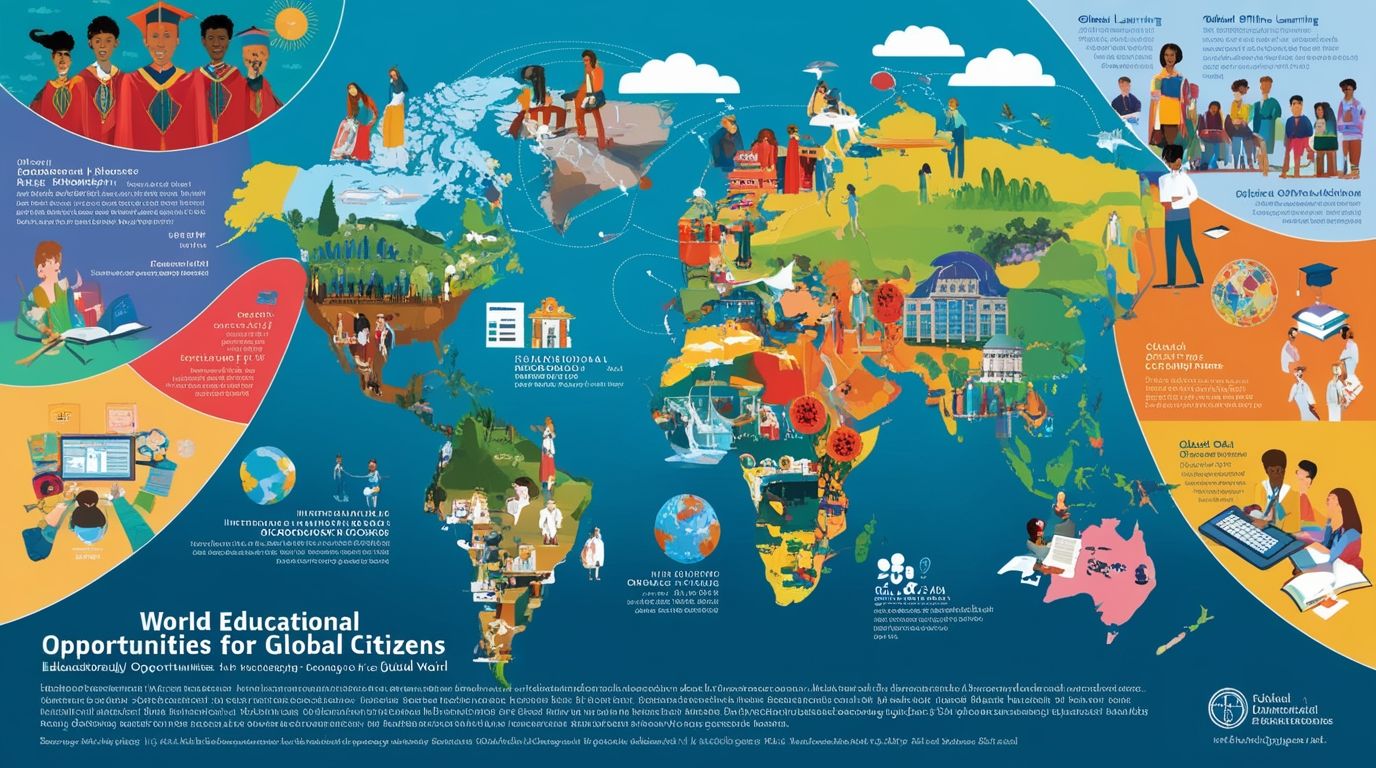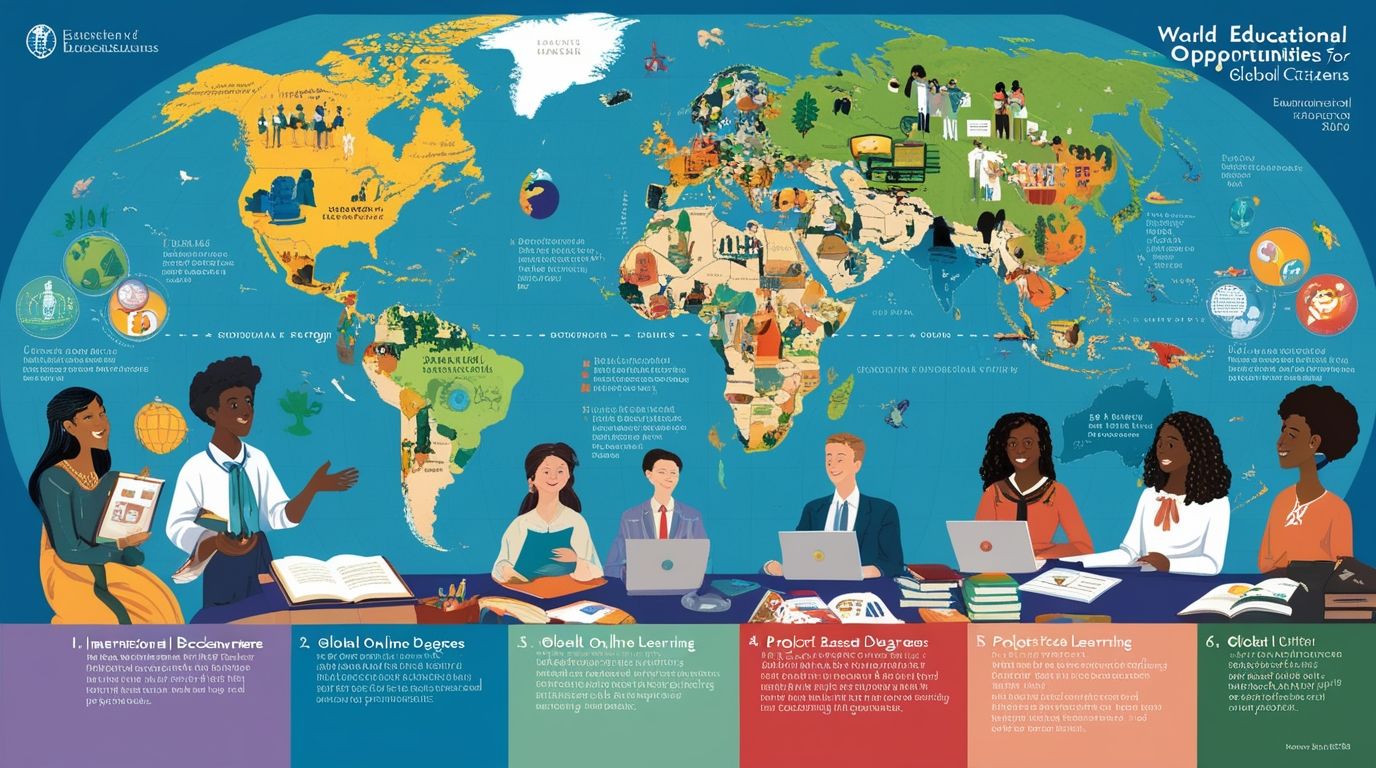World Educational Opportunities for Global Citizens, The concept of global citizenship has become increasingly important in today’s interconnected world, and education plays a pivotal role in fostering this identity. With globalization and technological advancements, education systems worldwide are evolving to cater to the needs of global citizens—individuals who possess the knowledge, skills, and values necessary to engage in cross-cultural interactions, understand global issues, and contribute to the global community. This article explores the variety of educational opportunities available to global citizens, focusing on the role of international programs, digital education, global competency curriculums, and the need for inclusive, equitable education across the globe.
1. International Programs and Institutions
International programs provide opportunities for students to experience different cultures, languages, and educational systems, broadening their perspectives and global awareness. The most prominent examples include student exchange programs, international schools, and global universities.
a. Student Exchange Programs: Organizations like AFS Intercultural Programs, Rotary Youth Exchange, and Erasmus+ offer exchange programs that allow students to study abroad for a semester or year. These programs enable students to immerse themselves in a foreign culture, learn a new language, and gain a deeper understanding of the world. In addition, they foster empathy, adaptability, and intercultural communication skills, essential qualities for global citizenship.
b. International Schools and Global Universities: International schools cater to expatriate families and local students seeking an international education. They typically follow global curricula such as the International Baccalaureate (IB) or Cambridge International Examinations, emphasizing critical thinking, global awareness, and intercultural understanding. Global universities, such as New York University’s Global Network and the University of London International Programmes, offer courses across multiple campuses worldwide, giving students the chance to study in diverse settings.
c. Scholarships for Global Citizens: International scholarships are another key opportunity for global citizens. Programs like the Fulbright Program, Chevening Scholarships, and the Rhodes Scholarship aim to create a network of scholars with global mindsets. These scholarships support individuals who wish to engage in cross-border learning and address global challenges such as inequality, climate change, and social justice.
2. Digital Education and Global Learning Platforms
Digital education has revolutionized access to knowledge, making it more inclusive and global. The rise of online learning platforms has opened up educational opportunities for people worldwide, particularly those in remote or underserved regions.
a. Massive Open Online Courses (MOOCs): Platforms like Coursera, edX, and FutureLearn provide access to thousands of free and low-cost courses offered by top universities and organizations globally. Learners can study diverse subjects ranging from artificial intelligence and business management to international relations and sustainable development. MOOCs democratize education, allowing individuals from any location to acquire knowledge and skills that align with the demands of a globalized world.
b. Virtual Exchange Programs: Virtual exchanges are growing in popularity as a low-cost alternative to physical exchange programs. These digital programs connect students across the globe to collaborate on projects, engage in discussions, and solve real-world problems together. Initiatives like Soliya’s Connect Program and Global Nomads Group create virtual spaces for intercultural dialogue and problem-solving, fostering global citizenship.
c. Global Online Degree Programs: The demand for flexible, remote education has led to the rise of fully online degree programs offered by renowned universities. Institutions like the University of London, Southern New Hampshire University, and the University of the People provide accredited degrees entirely online, making it possible for students to earn qualifications recognized globally without having to leave their home country.

3. Global Competency Curriculum in Schools
Developing global competence—understanding and appreciating cultural diversity, being aware of global issues, and possessing the skills to take action on them—is at the core of educating global citizens. Schools across the world are integrating global competence into their curriculums to prepare students for life in a connected world.
a. The Role of the International Baccalaureate (IB) Program: The IB curriculum is known for its focus on critical thinking, global awareness, and intercultural understanding. Its programs encourage students to explore complex global issues such as migration, climate change, and social justice through interdisciplinary approaches. IB students also participate in the Creativity, Activity, Service (CAS) component, which fosters community engagement and social responsibility, two key elements of global citizenship.
b. UNESCO’s Global Citizenship Education (GCED): UNESCO’s GCED framework encourages schools to promote global values such as peace, sustainability, and human rights. GCED aims to create active global citizens who can contribute to peaceful, tolerant, and inclusive societies. This initiative has led to the development of lesson plans, teacher training programs, and learning materials that emphasize global competencies.
c. Project-Based Learning for Global Issues: Schools around the world are incorporating project-based learning to engage students in tackling global challenges. For instance, through programs like Model United Nations (MUN), students simulate UN conferences, debating global issues such as poverty, conflict, and environmental sustainability. This hands-on approach cultivates skills in diplomacy, negotiation, and collaboration, all critical to becoming a global citizen.
4. Equitable and Inclusive Education
While educational opportunities for global citizens are expanding, there is still a pressing need to ensure equitable access to quality education, particularly for marginalized communities. In many parts of the world, barriers such as poverty, conflict, and gender inequality prevent individuals from accessing educational opportunities that prepare them for global citizenship.
a. Education for Refugees and Displaced Persons: Conflict and political instability have forced millions of people to flee their homes, disrupting access to education. Organizations like the United Nations High Commissioner for Refugees (UNHCR) and Education Cannot Wait work to provide educational opportunities for refugees, ensuring that they have the knowledge and skills needed to integrate into their host countries and contribute to global society.
b. Gender Equality in Education: Despite progress in promoting girls’ education, gender disparities still exist in many regions, particularly in sub-Saharan Africa and South Asia. Initiatives such as the Malala Fund and Girls Not Brides are working to eliminate gender-based barriers to education, advocating for policies that ensure girls have equal access to learning opportunities. Educating girls and women has been shown to have a transformative impact, contributing to economic growth, improved health outcomes, and greater political stability.
c. Bridging the Digital Divide: The rise of digital education offers enormous potential, but it also exacerbates inequalities for those without access to the internet and digital devices. To address this, governments and organizations are working to bridge the digital divide. Projects like Google’s Internet Saathi in India and One Laptop per Child are providing rural and underserved communities with the tools needed to access digital education and participate in the global economy.
5. The Role of Multilateral Organizations and Global Education Partnerships
The pursuit of global educational opportunities requires collaboration across borders. Multilateral organizations like UNESCO, UNICEF, and the World Bank play a critical role in shaping global education policies and ensuring that education is recognized as a universal right.
a. The Sustainable Development Goals (SDGs): The United Nations’ SDG 4 calls for “inclusive and equitable quality education” and lifelong learning opportunities for all. This goal underscores the importance of global partnerships in addressing educational disparities and promoting learning opportunities for global citizens, regardless of geographic or economic barriers.
b. Global Education Partnerships: Partnerships between governments, non-profits, and the private sector are essential to expanding educational opportunities. For instance, the Global Partnership for Education (GPE) works with governments in developing countries to strengthen their education systems and ensure that all children have access to quality education. These collaborations are crucial for fostering a generation of global citizens equipped to tackle the world’s most pressing challenges.
Conclusion
As the world becomes more interconnected, the need for global citizens—individuals who can navigate cultural differences, understand global issues, and work collaboratively across borders—has never been more urgent. Educational opportunities for global citizens are expanding, thanks to international programs, digital platforms, and global competency curriculums. However, there is still much work to be done to ensure that these opportunities are equitable and inclusive, especially for marginalized populations. Through sustained efforts and global partnerships, the world can ensure that every individual has the chance to become an empowered, informed, and engaged global citizen.
References:
- UNESCO. (2020). Global Citizenship Education: Preparing Learners for the Challenges of the 21st Century.
- United Nations. (2015). Transforming our world: the 2030 Agenda for Sustainable Development.
- UNICEF. (2021). Education Cannot Wait: Education for Refugees and Displaced Persons.
- International Baccalaureate. (2022). What is IB Education?

17 thoughts on “World Educational Opportunities for Global Citizens”
Comments are closed.